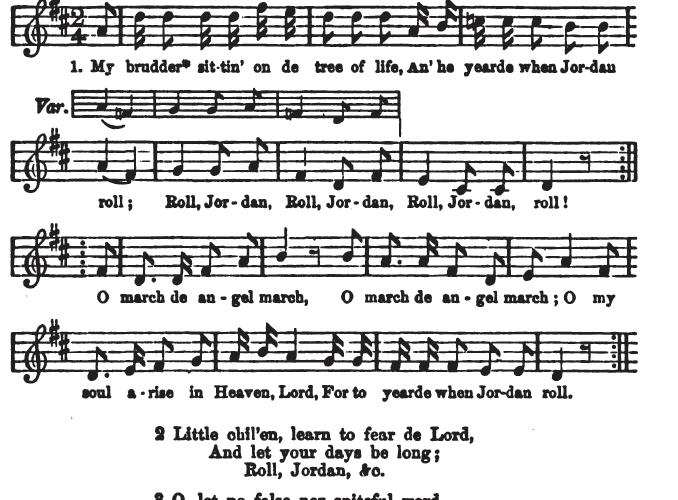Roll Jordan Roll
Theme: Revolutionary ideas, Challenging law and order: British riots and reforms, Social and cultural revolution, Haitian revolution (1791 - 1804), Challenging slavery: abolition and opposition, People in motion: exiles and opportunities
Roll Jordon Roll is a spiritual, sung by enslaved Africans working on plantations in the Americas in the 1800s in resistance to their enslavement and cruel treatment.
Between the 1500s and early 1800s, millions of Africans were kidnapped, sold and transported to the Americas to work as slaves, in unimaginably cruel conditions, on hugely profitable plantations. These plantations were largely owned by Europeans. Britain grew rich on the profits from this transatlantic slave trade, but public opinion slowly turned against it from the late 1700s. Enslaved people also found ways of resisting their masters and fighting for their freedom.
Slavers were acutely aware of the threat of revolt and resistance by slaves and made consistent attempts to break their spirit and dehumanise them, through cruel physical and psychological treatment and punishments. One of the most important aspects of resistance among slaves was maintaining their own identity, through retaining African cultures or melding African, American and European cultural forms to create new ones.
Adapting and appropriating songs to their own needs, language and communities was a prime example of this. These songs often had Christian origins and became known as spirituals. They were sung by enslaved people as songs of worship, subversion or simply as an emotional release. Roll, Jordan, Roll was written by Charles Wesley, an English Methodist preacher in the 1700s, and introduced to slaves working on plantations in the Americas in the 1800s. It was soon adopted and adapted and, Iike many spirituals, is claimed to include coded messages – the River Jordan, for example, symbolising the Mississippi and the Ohio rivers as a route north and to freedom.
Different versions of this song have been sung and passed from place-to-place and generation-to-generation through the oral tradition. More recently, they have been recorded by a whole range of artists. Here are some examples:
Fisk University Jubilee Quartet, 1909
Did you know..?
A version of this song was sung by Topsy Chapman, Chiwetel Ejiofor and others in the 2013 film 12 Years a Slave, directed by Steve McQueen. The impact of the song and in its collective singing can clearly be seen on the face of the lead character, Solomon Northup in this powerful scene.
Sources & acknowledgements
This object description and its related educational resources were researched and written by our team of historians and education specialists. For further information see the item’s home museum, gallery or archive, listed above.
- Enquiry Questions
-
Did you know..?
The Grammy Award winning singer-songwiter John Legend also recorded a version of Roll Jordon Roll which was featured in the film 12 Years a Slave.
-
Education overview
You can access a range of teachers resources related to this object and more on our education page.
Please also see our glossary of terms for more detailed explanations of the terms used.
-
Use this image
Image from: Slave Songs of the United States, 1867 – Public Domain
You can download and use the high resolution image for use in a non-profit environment such as a school or college, but please take note of the license type and rights holder information below.
- License Type:
This image is in the Public Domain.
- License Type:



